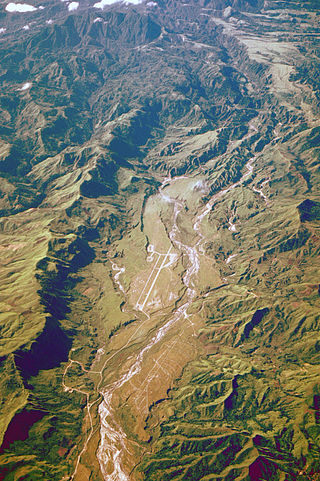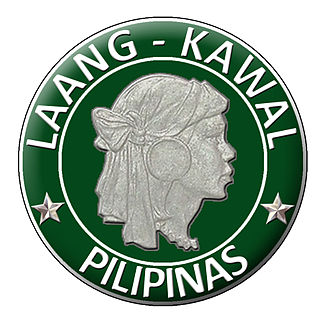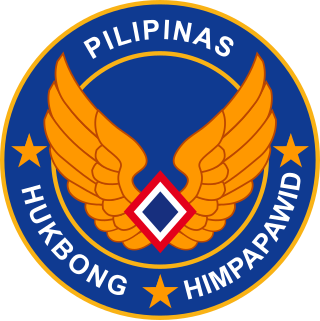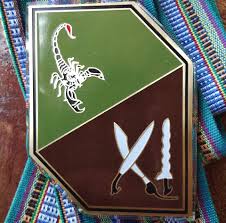
The Armed Forces of the Philippines (AFP) are the military forces of the Philippines. It consists of three main service branches; the Army, the Air Force, and the Navy. The President of the Philippines is the Commander-in-Chief of the AFP and forms military policy with the Department of National Defense, an executive department acting as the principal organ by which military policy is carried out, while the Chief of Staff of the Armed Forces of the Philippines serves as the overall commander and the highest-ranking officer in the AFP.

Counterintelligence (counter-intelligence) or counterespionage (counter-espionage) is any activity aimed at protecting an agency's intelligence program from an opposition's intelligence service. It includes gathering information and conducting activities to prevent espionage, sabotage, assassinations or other intelligence activities conducted by, for, or on behalf of foreign powers, organizations or persons.

The Philippine Navy (PN) is the naval warfare service branch of the Armed Forces of the Philippines. It has an estimated strength of 24,500 active service personnel, including the 10,300-strong Philippine Marine Corps. It operates 90 combat vessels, 16 auxiliary vessels, 25 manned aircraft and 8 unmanned aerial vehicles. Tracing its roots from the Philippine Revolutionary Navy on May 20, 1898, while its modern foundations were created during the creation of the Offshore Patrol on February 9, 1939, the PN is currently responsible for naval warfare operations and maritime patrol missions within the Philippine Waters, as well as ensuring the protection of the Philippine's maritime interests, including the South China Sea and Benham Rise.

The National Intelligence Coordinating Agency (NICA) is the primary intelligence gathering and analysis arm of the Government of the Philippines in charge of carrying out overt, covert, and clandestine intelligence activities. The NICA directs, coordinates, and integrates all intelligence activities, both foreign and domestic, concerning national security, serving as the leading intelligence collector of the national government, focusing on the country's strategic intelligence requirements. It is mandated to prepare intelligence estimate on local and foreign situation for the formulation of national security policies by the President and the National Security Council.

The Light Reaction Regiment is the only tier one special forces of the Philippine Army (PA). Formed in the Early 2000s, and was formerly known as the Light Reaction Battalion and Light Reaction Company. Due to its specialization in black operation, capture or kill high-value targets, counterterrorism and hostage rescue crisis management, direct action, executive protection, irregular warfare, and special operations that are extremely high-risk and dangerous. The formation of the unit is assisted by American advisers, the Light Reaction Regiment has been sometimes referred to as the Philippines' Delta Force.

Colonel Ernesto Ravina Air Base (CERAB) or Crow Valley Gunnery Range, and formerly the Tarlac Military Testing Ground, was the main bombing range of the United States Armed Forces in the western Pacific, and by the Armed Forces of the Philippines. It is located in Camp O'Donnell in Tarlac, Philippines. The 68-kilometre (42 mi) facility is located approximately 22 kilometres (14 mi) from Clark Air Base and is primarily used for aerial combat training, which include bombing and strafing practice, as well as ground unit maneuver and live fire exercises.

The 2nd Infantry Division, Philippine Army nicknamed Jungle Fighter, is the Philippine Army's primary infantry unit specializing in jungle warfare.

The 15th Infantry Division, Philippine Army, known as the Defender & Builder Division, is one of the Army Reserve Command's ready reserve infantry divisions.

The Armed Forces of the Philippines Special Operations Command (AFPSOCOM) is the unified special operations command of the AFP. It is responsible for planning, conducting, and supporting special operations.

The Philippine Air Force (PAF) is the aerial warfare service branch of the Armed Forces of the Philippines. Initially formed as part of the Philippine Army as the Philippine Army Air Corps (PAAC) in 1935, the PAAC eventually saw combat during World War 2 and was formally separated from the Army in 1947 as a separate service branch of the AFP under Executive Order No. 94. At present, the PAF is responsible for both defending Philippine airspace, and conducting aerial operations throughout the Philippines, such as close air support operations, combat air patrols, aerial reconnaissance missions, airlift operations, helicopter tactical operations, special operations, and aerial humanitarian operations, which includes search and rescue operations. The PAF has also carried out various missions within the country and abroad.

The 525th Expeditionary Military Intelligence Brigade (Expeditionary) is a unit of the United States Army specializing in the acquisition and analysis of information with potential military value. On 28 October 2014, the unit was reflagged from the "525th Battlefield Surveillance Brigade" to an expeditionary military intelligence brigade, the first of its kind.

Delfin Negrillo Lorenzana, OLH, KGOR is a retired Philippine Army general who served as Chairman of the Bases Conversion and Development Authority from 2022 until September 2024. He previously served as Secretary of National Defense in the Cabinet of President Rodrigo Duterte from 2016 to 2022. He served in the Philippine Army from 1973 to 2004.

Bartolome Vicente "Bob" Orpilla Bacarro is a retired Philippine Army lieutenant general who served as the 58th chief of staff of the Armed Forces of the Philippines from 2022 to 2023. He previously commanded the Southern Luzon Command. In 1991, Bacarro was awarded the Armed Forces of the Philippines Medal of Valor for his actions against the New People's Army in Maconacon, Isabela.

Carlito Guancing Galvez Jr. is a retired Philippine Army general serving as the Senior Undersecretary and briefly as officer-in-charge of the Department of National Defense since 2023 and Presidential Adviser on the Peace Process since 2018. He also served as the Chief Implementer of the Philippines' Declared National Policy Against COVID-19. In November 2020, he was appointed as the country's COVID-19 vaccine czar, and was responsible for leading the government's efforts in bringing into the country about 245.23 million doses of COVID-19 vaccines as of May 2022 beginning in 2021 despite the global vaccine shortage. Prior to this, he also previously served as the 50th Chief of Staff of the Armed Forces of the Philippines from April to December 2018.

Benjamin Rasgo Madrigal Jr. is a retired Philippine Army general serving as the Administrator of the Philippine Coconut Authority under the Duterte administration since January 2020. He previously served as the Chief of Staff of the Armed Forces of the Philippines from December 2018 to September 2019. He is a graduate of the Philippine Military Academy "Sandiwa" Class of 1985, along with his predecessor Gen. Carlito Galvez Jr.

The 11th Infantry Division, Philippine Army, also called the Alakdan Division, is one of the Philippine Army's infantry units in Mindanao. Currently still forming, the Division is expected to complete its equipment and manpower requirements by 2022. It is the youngest of all the infantry divisions of the Army and will have 4,500 troops when fully formed.

Macairog Sabiniano Alberto is a Filipino retired general and diplomat who served as the former Commanding General of the Philippine Army. He is a graduate of the Philippine Military Academy "Sinagtala" Class of 1986.

Rolando Joselito Delizo Bautista is a retired Filipino lieutenant general who served as the Secretary of Social Welfare and Development under the Duterte administration from 2018 to 2022. He held various positions in the military, such as the former Commanding General of the Philippine Army, commander of the Joint Task Force Marawi during the Battle of Marawi, and the Presidential Security Group.

Andres Castor Centino is a retired Philippine Army general who currently serves as Presidential Assistant on Maritime Concerns to President Bongbong Marcos since September 2023.

Romeo Saturnino Brawner Jr. is a Philippine Army general who has served as the 60th Chief of Staff of the Armed Forces of the Philippines since July 21, 2023. Prior to his appointment to the post, Brawner previously served as the 64th Commanding General of the Philippine Army.




















